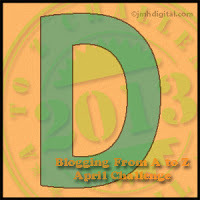Discussing Dialogue = D: Blogging from A to Z
I was torn on picking a literary device for D. Denouement is such a critical piece in any work of fiction, while deus ex machina is an important element for an editor to highlight. (deus ex machina = a machination, or act of God--resolving the primary conflict by means unrelated to the story, or an act of God)
 But ultimately I had to go with dialogue.
But ultimately I had to go with dialogue.
Effective dialogue must...
1) Sound like people speaking
Nothing is worse than reading dialogue that sounds like prose. I want to feel like I'm listening in on a private conversation.
2) Defines characters
Think about it... how do people get to know you in real life? Is it through a series of well-written, poetic journal entries? No, people get to know you through what you say. A speaker's dialect is an indication of where he/she is from, slang can suggest age/generation, and tone can say a lot about personality.
3) Quickens the pace
Too many paragraphs of description lose me every time. I'm a fast reader, and dialogue stays with me much longer than prose... and it doesn't slow me down, especially well-written, naturally flowing dialogue.
Dialogue can also be a road block.
For example, I don't want an author to spell words like a character says them. If it's clear that a character is from the deep South, for example, I don't need the words to reflect that. Think The Help. I'm from the South, and I could barely get through the first fifty pages of that book. Granted, I did get in the groove and ultimately loved the book. But don't tempt your reader to quit.
Second, writers should read their dialogue out loud. If you stumble, so will the reader. Unnatural dialogue is a death knell for story.
Will well-written dialogue make a book for you? Can poorly-written dialogue make you put one down?
Check out the other D posts here .
 But ultimately I had to go with dialogue.
But ultimately I had to go with dialogue.Effective dialogue must...
1) Sound like people speaking
Nothing is worse than reading dialogue that sounds like prose. I want to feel like I'm listening in on a private conversation.
2) Defines characters
Think about it... how do people get to know you in real life? Is it through a series of well-written, poetic journal entries? No, people get to know you through what you say. A speaker's dialect is an indication of where he/she is from, slang can suggest age/generation, and tone can say a lot about personality.
3) Quickens the pace
Too many paragraphs of description lose me every time. I'm a fast reader, and dialogue stays with me much longer than prose... and it doesn't slow me down, especially well-written, naturally flowing dialogue.
Dialogue can also be a road block.
For example, I don't want an author to spell words like a character says them. If it's clear that a character is from the deep South, for example, I don't need the words to reflect that. Think The Help. I'm from the South, and I could barely get through the first fifty pages of that book. Granted, I did get in the groove and ultimately loved the book. But don't tempt your reader to quit.
Second, writers should read their dialogue out loud. If you stumble, so will the reader. Unnatural dialogue is a death knell for story.
Will well-written dialogue make a book for you? Can poorly-written dialogue make you put one down?
Check out the other D posts here .
Published on April 04, 2013 04:00
No comments have been added yet.



